Herald: The Interactive Period Drama – Complete Edition review
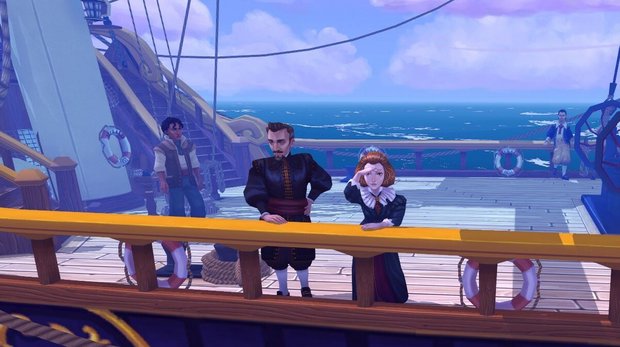
- 0 Comments
The gameplay may be shallow, but the full four-part high seas adventure sails by on its compelling story and characters
Fans have been waiting eight years for the conclusion to Herald: An Interactive Period Drama. After the first half launched in 2017, the narrative-heavy game was left on a cliffhanger, with only sparse updates from developer Wispfire in the subsequent years. Many thought that the conclusion to Books I & II would never arrive. Fortunately, skeptics were proven wrong when Herald: The Interactive Period Drama – Complete Edition was released, with Books III & IV finishing the story at last. Whether you will find the finale to Herald worth the wait, however, depends on how much you enjoy choice-based, character-driven visual novels. Personally I found plenty to love in this game, from a compelling story to a colourful cast of characters to a fascinating alternate history setting, and I was hooked until the very end.
Herald throws the player into the deep end, both literally in that the game opens on the protagonist drowning, and figuratively in that it starts in medias res. You play as Devan Rensburg, a steward on the titular sailing ship over the course of one fateful voyage in the 19th century. In this alternate history, Western Imperialism has become an even more domineering presence in the form of the Protectorate, which has divided the world into Eastern and Western colonies, all ruled over by a “Lord Protector” (the title of real-life historical figure Oliver Cromwell, who co-founded the Protectorate in the world of the game).
Devan’s journey is told through a framing narrative in which he recounts his adventure to a mysterious woman initially referred to only as “The Rani,” who appears to be holding him captive. As Devan begins his story, you are transported to his first day on the Herald, starting off by doing odd jobs around the ship, such as fetching sails and finding lost items. This slow beginning lulls you into a false sense of ease until you are brutally thrust into a tragic turn of events that culminates in you being responsible for saving another character’s life.
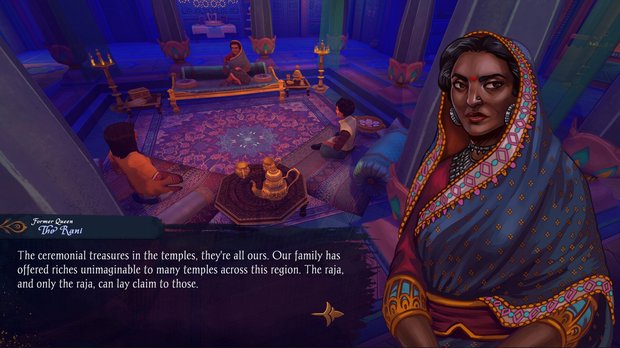
I describe these events vaguely both to avoid spoilers and because Herald is a choice-based game in which any dialogue option can have lasting consequences, so the events at the end of Book I can play out differently depending on your decisions. Unlike some other choice-driven games, there is no indication of when a decision is going to be important, so you must weigh every dialogue option carefully, lest you find yourself in the position I did – by which I mean some split-second decisions I made in the finale that led to the worst possible ending.
I don’t think the bad ending I got was solely attributable to me making spectacularly poor decisions, however. I was following along with the plot pretty earnestly, even making notes. But the final moments lost me a little, with the pace suddenly picking up to breakneck speed, coupled with a lot of complex political info dumps being thrown at me all at once. I found it difficult to predict the effects certain choices would have, a problem I didn’t experience throughout previous sections. It was disheartening to suddenly have everything crumble around me in a way that I didn’t even fully understand, especially after I’d made so many “good” decisions earlier in my playthrough. But there’s an element of realism to this, to how quickly a situation can spiral out of control. In real life, it doesn’t necessarily matter if you did everything “right” – disasters can happen anyway.
But even the smaller dialogue choices in Herald make a difference throughout. Devan is of mixed race descent, having been born in “The Eastern Colonies” (what we know as India) but raised in the West, where he faced discrimination growing up. He is travelling back to India to reconnect with his roots. But along the way, you witness racist microaggressions inflicted upon him by the white sailors and passengers, who are generally of higher social status than him. There’s an inherent tension in his dialogue options with the more powerful people on the ship, and the instinct is to fight back in small rebellious acts, such as adding an excessive amount of salt to a rude politician’s meal, instead of groveling and genuflecting. However, both courses of action have consequences and affect the weightier decisions in the game.
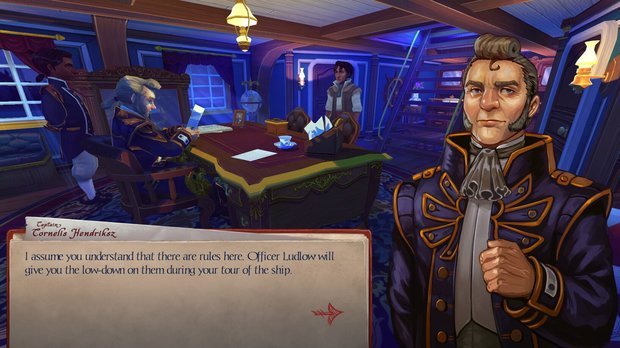
These dialogue choices make up the bulk of Herald’s gameplay. Lengthy conversations are interspersed by simple point-and-click sections in which you navigate around the ship, usually hunting for significant items. These free-roam sections won’t provide much of a challenge, especially if you’re a seasoned adventure gamer, but I appreciated the way they broke up the gameplay and added just a tad more interactivity while familiarizing myself with the vessel. If you’re a puzzle fan, however, you won’t find much to sink your teeth into here. The only puzzle-like moments are few and far between and not particularly difficult, such as discovering a secret compartment in one of the cabins or answering a riddle posed by one of the crew. Items you pick up are automatically presented to characters who require them, so there aren’t even any inventory puzzles.
These puzzles tie into the vignettes through which Herald’s story is mostly told. Each of these short scenarios works to build a picture of the larger political situation and rising tensions unfolding in the Protectorate, pointing towards justified unrest in the Colonies, which is gearing up towards a revolution. For example, when a stowaway is discovered on board, the captain and one of the passengers, Senator Louis Morton, stage an impromptu trial for the person responsible. They demonstrate their bias by trying the culprit more harshly based on their country of origin, all while spouting hypocrisies like “All refugees to the free world are welcomed by the Protectorate and its allies.” This event completely shatters the captain’s and the senator’s outer sheen of civility and demonstrates the true attitudes of the Protectorate to those who are “other” to them.
Herald’s visual style is a mix of 3D models and environments with painted 2D characters during conversations. Although the settings are fairly basic, the sunset-hued palette grants a stylisation that elevates the aesthetic. The Rani’s hideout where you spend the intermissions between chapters is the most visually appealing space, making good use of the full breadth of colours and bringing in a richness of different textures such as gauzy curtains and jewel-toned rugs to convey the sumptuousness of the space. The ship’s upper deck is another striking location, with the waves rushing by, subject to a breadth of lighting and weather conditions, from hazy sunrises to grey rain. It’s almost always a hive of activity, with sailors performing tasks such as climbing the rigging and swabbing the deck. The animations are minimal, but it still gives the impression of the ship being alive.
When conversing with other characters, large 2D models appear on-screen, depicting a stock range of emotions, as is typical for most visual novels. The artwork for these portraits is gorgeous and portrays the characters in greater detail. Each has their own distinct look that speaks to their personalities: Devan is a cross between a Calvin Klein model and a Romantic hero, with his tousled curls and sultry pout; the captain’s constant half-smirk captures his arrogant attitude; the Lady Tabatha Veazie’s unruly hair suggests a playful nature belied by her elevated position in society, while her wide eyes contain both her curiosity and naivety. The more simplistic 3D models with their doll-like proportions have a certain charm to them as well, even if they are constantly staring blankly into the distance as if mentally disassociating to an entirely different plane of reality.
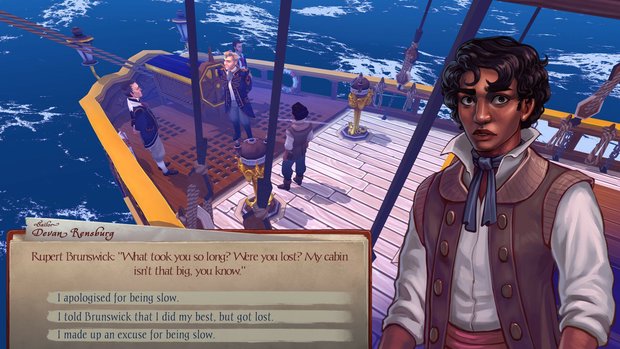
The dialogue box is stylised to look like Devan’s journal; a thoughtful way to represent him recording the events of his journey. The journal also acts as an in-game menu, containing a map of the ship, a task list, a summary of all the choices you’ve made so far, and an encyclopedia that includes lore and a character list. The latter is especially useful, as there are many characters to keep track of, each with a different role to play, from lowly cabin boy to the captain of the Herald.
As you might expect for the crew of a sailing ship, those travelling on board hail from a wide variety of international locations and accordingly have different regional accents. Unlike many visual novels, each line of dialogue here is fully voiced. For the most part the performances are excellent, with the actors really embodying the different characters they play, although there are a few who sound a bit less professional than others.
Surprisingly, given the number of characters, they’re all quite dynamic and well-rounded. Even the minor characters have their own distinct personalities and mini character arcs. Of all those on board, Devan becomes especially close with Second Officer Aaron Ludlow and Lady Tabatha, one of the passengers. The three of them become friends after discovering a stowaway aboard the ship, and further connect by way of amateur sleuthing as they investigate the contents of a mysterious letter Tabatha suspects that her uncle – a senator – is deliberately concealing from her. She enlists Devan and Aaron’s help, revealing that she believes the letter contains news of her father, a regent who lives apart from her in the Eastern Colonies.
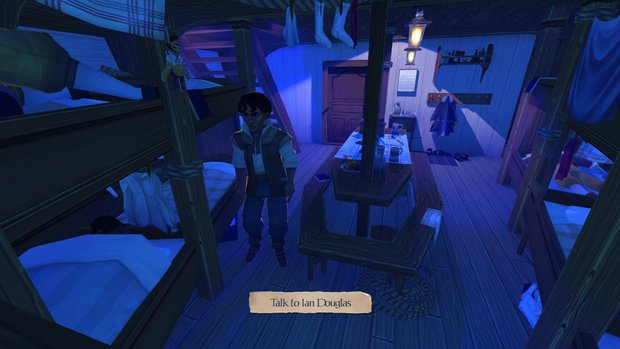
Tabatha has the spunk of a Disney heroine without being too saccharine, while Ludlow is passionate and impetuous. I became attached to both of them. Devan is slightly less characterised than the other two, but this makes sense for the main protagonist, allowing room for players to project themselves into the role. And since Devan’s character arc revolves around him grappling with his place in the world and trying to find himself, it’s understandable that his personality is not as rigid. His journey is not just literal, but also an inner journey of self-discovery.
While the stakes rise throughout the six or so hours of playtime, with the Protectorate’s larger political tensions reflected in microcosm aboard the Herald, the pacing remains fairly slow, apart from the explosive ending. There are many diversions from the main plotline, such as discovering the truth behind rumours of a ghost on board the ship, and helping the cook prepare a meal. As someone who enjoys a slow-paced story, this didn’t bother me. You’re given time to become more familiar with the complex politics of the world, and the plot twists are more impactful when they hit, as there’s extra space for them to be set up.
However, this meandering pace emphasised a surprising split in the narrative tone. At times Herald is a light, adventurous romp, but at others it is a dark, bloody tale about the traumatic effects of colonialism. The score contributes to this feeling of incongruity, its jauntiness often feeling at odds with the darker themes. Don’t get me wrong: the music is catchy – if a little repetitive – but it feels strange, to put it mildly, when played over a scene in which a character is telling you they’ve seemingly been groomed. The audio mixing also feels a bit off, particularly in the final Book. Some sound effects, such as that of a lantern smashing, are much too loud in comparison to the dialogue and music.
I didn’t play Herald when Books I and II were first released, although it’s been on my radar for nearly that long. If I didn’t know the history of the game’s development, I probably would never have realised such a massive gap stood between the two sections, as they’re quite seamlessly integrated. The only point that felt a bit rushed was the ending, although that sensation might have been intentionally cultivated to portray the intensity of the moment. Choices made in Book I continue to have a bearing on events towards the very end of the story. For instance, the mysterious letter I mentioned: the very first decision you can make is whether to encourage the captain to read it or not (despite the letter not being addressed to him). The contents of that letter return with devastating impact towards the end of the game, that very first choice factoring into one of the most dramatic scenes.
Final Verdict
Herald’s ultimate strength is its story, and it knows it. The other elements exist to serve its narrative: the limited interactivity, the basic graphics, the repetitive music. But the characters and the story, with all its highs and lows, kept me gripped through my entire playthrough. If you’re looking for a traditional adventure with lots of brain-teasing puzzles, you certainly won’t find that here. However, any lovers of intricate political plotlines as well as fans of visual novels will find a lot to enjoy in Herald: The Interactive Period Drama, whether you’ve been patiently waiting for years for a conclusion, or just discovering the complete game for the first time.
Hot take
Herald is light on gameplay but tells a complex, well-written adventure story that takes players on a journey both literal and emotional, through themes which, though based on historical events, are still incredibly resonant today.
Pros
- Vivid, twisty story with meaningful themes
- Well-researched alternate history setting
- Complex and culturally diverse characters
- Choice-based gameplay that actually matters
Cons
- Inconsistent tone
- Rushed, confusing ending can lead to terrible unintended results
Chloe played Herald: The Interactive Period Drama – Complete Edition on PC using a review code provided by the game's publisher.


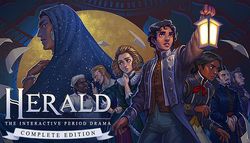




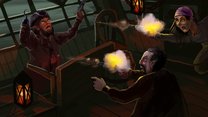



0 Comments
Want to join the discussion? Leave a comment as guest, sign in or register in our forums.
Leave a comment